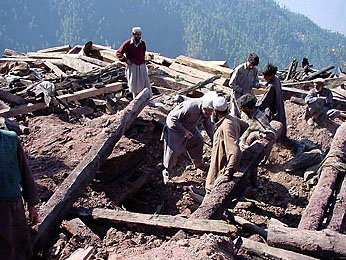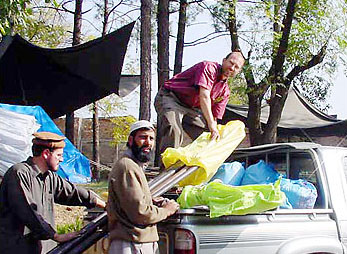|
Web Exclusives: PawPlus
January 25, 2006: ‘Not
prepared for the devastation’ Jonathan Miller *92 of Cary, N.C., describes his 10 days of earthquake relief efforts in Pakistan as “the most intense and fulfilling week of my life.” Mitchell, who previously had managed programs in Pakistan, worked with Bach Christian Hospital, a mission hospital, to provide shelter to individuals in hard-hit areas. I arrived in the earthquake zone on Saturday, Oct. 29, and left Sunday morning to check on the condition of some of our friends who live far up one of the heavily affected valleys. We passed through the town of Balakot, whose images have dominated the news. Despite having seen these pictures and hearing of the destruction, I was not prepared for the devastation. Not only the homes of our friends, but the bazaars, mosques, government offices, hotels, hospitals, gas stations, and power pylons were flattened. The four-story Park Hotel wasn’t even a pile of rubble; it had fallen into the river. As we drove out of town up the river, there was a steady stream of people evacuating on foot. They carried little, having come many miles down countless steep descents and treacherous rockfalls. I don’t think any of them would have been prepared for the scene awaiting them in Balakot, where they were expecting shelter. Our destination was Budgran, a small settlement up at about 7,500 feet above the town of Kawai. We had heard of many deaths in the settlement, and we knew that they would be among the last to receive any assistance given the remoteness of their village. We arrived at Budgran shortly before nightfall. We walked past the 10 fresh graves before arriving at the “home” of Ashraf. I hadn’t seen him in more than 15 years, but he welcomed me with a whoop and a big hug. There were 10 minutes of exchanging greetings and reminiscing before we came to the topic of the earthquake. He had lost his wife, two children, and his brother Aslam. His brother Akram’s arm was badly broken; he was in Islamabad for treatment. And Ashraf’s own foot was broken. Along with that, he lost about a third of the animals on which his family’s livelihood depends. And, yes, winter was coming, and with it maybe 12 feet of snow. It was getting dark, and I needed to identify a helipad in order to phone in the coordinates. The plan was for an army helicopter to deliver 20 tents as temporary shelter. I walked up above the village and found a perfect site. I repeated the coordinates several times on the satellite phone, then left to break the fast with Ashraf and his family. I had brought some Power Bars for supper, but they wouldn’t hear of it. Knowing their desperate situation, I was so uncomfortable accepting their offer, but I also knew how wounded they would feel if I refused. They fed us rice with lentils and loads of smoky tea, which beats an energy bar any day. As we sat there beside the fire with the high ridges around us fading into the night, I marveled at the resilience of these people. I heard several children singing, the women were chattering among themselves, and we men were cracking jokes and telling stories. In the dark, you couldn’t tell that there had been such a tragedy just days before. But then the talk would turn to the future, and there would be silence. The future looked pretty grim. Winter was coming, and they had no shelter. If they moved down, there would be no provision for their animals. Their animals are their livelihood. Talk moved to shelter designs and what would be needed, and how that could be procured and carried up so far. They asked me what they should do, but how do I know? I couldn’t survive up there. The next day the helicopter crew didn’t like our coordinates (too high), and they didn’t want to land where there were no troops to control a crowd. All my sweet-talking made no difference. By 3 p.m. the tents were on a helicopter, but they were going to drop them in Kawai, deep in the valley below. The able-bodied men headed down to begin hauling them up, unwieldy 70-pound loads with long poles. One by one, the tents disappeared as the men carried them off into the dusk, leaving 13 people who had come down for whom we had no more tents. I gave each a chit to pick one up at noon the following day where the road ends. It wasn’t until later that I was struck by something. As I had walked through Kawai to secure the tents, it was dusk and people were preparing to break the Ramazan [known as Ramadan in other countries] fast. Between the rubble of their homes and the graves of family members, survivors had lit small fires to cook from the remains of their winter stores. As I passed by, each family not only invited me, they insisted that I join them. I had always admired the hospitality of Pakistanis, but this was beyond admiration. These people had lost everything, and their very survival was in question. Were the roles reversed, I would be thinking of what to feed my children next week, not of the needs of a stranger passing by. It made my heart glow to have witnessed such generosity, and I was struck again how each culture has unique strengths. I realize that in volunteering in the earthquake relief effort,
I have received much more than I have been able to give. And
those I was able to help probably feel the same way, perceiving
the balance to be in their favor. I guess this is what economists
think of as Pareto efficiency, as any Woody Woo will tell you. Jonathan Miller *92 works for the Research Triangle Institute as a senior education scientist, managing programs around the world that deal with education policy and finance. His parents were missionaries in Pakistan when he was a child. After he completed his MPA in 1992, he began a doctoral program at the University of Colorado at Boulder. He took his family in 1994 to northern Pakistan to manage the education portfolio of the Aga Khan Development Network. In 2003, he joined USAID as senior education officer for Pakistan, where he worked for a year before returning to the United States.
|
||


